Collection
Date
Location
Type
17 results
Remembering 1807
In 1807 Britain legally abolished the slave trade, although it continued to participate in and profit from the institution of slavery. In 2007 the British government committed public funds to mark the bicentenary of the Slave Trade Act. The Remembering 1807 project has collected and archived material relating to the many events and activities that took place during 2007. These records help us to locate and understand the place of slavery, the slave trade and its abolition in the UK’s public history, commemorative traditions and popular memory. Background to the collection...
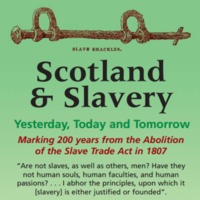
Scotland and Slavery
Action of Churches Together in Scotland (ACTS), which brings together nine Scottish denominations, marked the bicentenary with the Scottish Ecumenical Service to commemorate abolition held in the David Livingstone Centre in Blantyre in June 2007. The group also published a leaflet, ‘Slavery and…
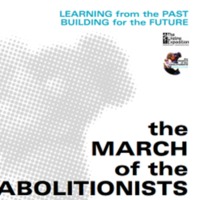
The March of the Abolitionists
The Lifeline Expedition began in 2000 as a reconciliation journey linking the European and African nations. The March of the Abolitionists was organised for 2007, aiming to bring an apology for the slave trade (especially the role of the church); to promote understanding of slavery and abolition by…
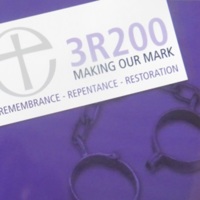
Making our Mark: Remembrance, Repentance and Restoration in 2007
This project was the Church of England’s official response to the bicentenary, as CMEAC (established by the Archbishops’ Council) explored the Church’s multi-faceted role in the history of slavery in Britain. Making our Mark focused on connections with local communities, opening access to…
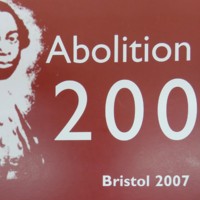
Abolition 200
Bristol was major trading port for the transatlantic slave trade in the 18th century. The city of Bristol marked the bicentenary of the Abolition Act with more than 100 events across the city - exhibitions, plays, debates, talks, concerts - under the umbrella organisation Abolition 200. In January…
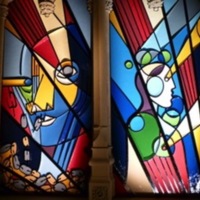
Reconciliation Reredos
The Reconciliation Reredos project to develop a major public artwork was the response by Saint Stephen’s Church in Bristol city centre to a complex historical legacy. St Stephen's was the harbour church which benefitted from merchant’s donations, which effectively ‘blessed’ slave trade ships…
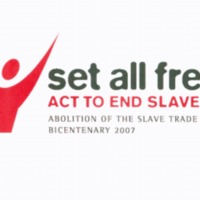
Set All Free: ACT TO END SLAVERY
Set All Free: ACT TO END SLAVERY was a project of Churches Together in England, based in London. It was also a collaboration between church-related groups, societies and organisations around the UK working together with a Christian ethos to assess the relevance of the bicentenary, and in particular…
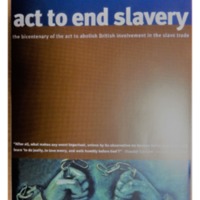
Set All Free Gloucestershire
The Gloucestershire Set All Free initiative was organised by Churches Together in Gloucester and other organisations to mark the bicentenary. An Events Guide set out some of the events, lectures, film screenings, music festivals and exhibitions taking place in Gloucestershire to remember the horrors…
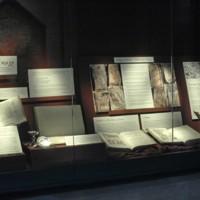
Distorted Image
Inspired by the bicentenary, the Distorted Image exhibition at Hereford Cathedral explored how distorted perceptions throughout history have resulted in prejudice, discrimination and enslavement. Incomplete or misleading images of human beings, who are black or female or in some way considered…
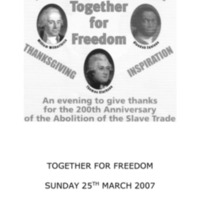
Wilberforce 2007 at Holy Trinity Church
Hull's parish church of Holy Trinity is where William Wilberforce was baptised in 1759. The Church held a number of performances and events throughout 2007. The Together for Freedom commemorative service took place on 25 March 2007, led by the Archbishop of York and featuring the Redemption Gospel…
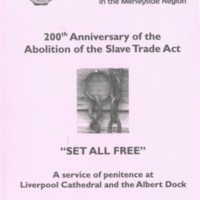
A service of penitence at Liverpool Cathedral and the Albert Dock
A multi-faith service of penitence and remembrance was held at Liverpool Cathedral on 24 March 2007 by Churches Together in the Merseyside Region. Some material in the service drew upon resources produced by Set All Free, the project of Churches Together in England. A musical welcome was offered by…
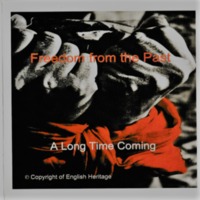
Freedom from the Past: Long Time Coming
A collaborative project between Churches Together in Northampton, English Heritage, Northamptonshire Black History Association (NBHA) and The Northampton Schools Excellence Cluster. Freedom From the Past: Long Time Coming was led by Mary Clarke, Director of the Doddridge Centre, where the NBHA…
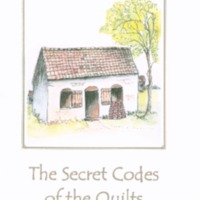
The Secret Codes of the Quilts
The Quaker Quilters of Norwich Quaker Meeting held the Slave Quilts Exhibition at the Friends Meeting House in Norwich in May 2007. By the 1860s in the United States there were organised flights to freedom for enslaved people from the southern plantations via the Underground Railroad – a network…
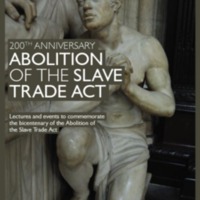
Service to Mark the Bicentenary of the Abolition of the Slave Trade Act
Westminster Abbey organised a series of lectures and events to commemorate the bicentenary. These included the lectures 'Olaudah Equiano, Black Abolitionist' by Professor Vincent Carretta, and 'The Abbey and the Abolition of the Slave Trade' by The Reverend Nicholas Sagovsky, Canon of Westminster.…
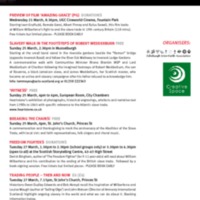
Marking the 200th anniversary of the Abolition of the Slave Trade
A programme of events to mark the bicentenary was organised by Edinburgh Inter-Faith Association. This included a slavery walk in the footsteps of Robert Wedderburn, a commemoration and thanksgiving service at St John's Church in Edinburgh, and a debate and discussion on the theme 'Trading People -…
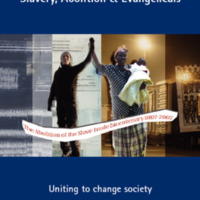
Slavery, Abolition & Evangelicals: Uniting to change society
The official publication from the Evangelical Alliance to commemorate the bicentenary had three main aims: to draw attention to biblical perspectives on slavery and society, to examine the contributions of some key abolitionists, and to offer some suggested activities for churches and groups to mark…
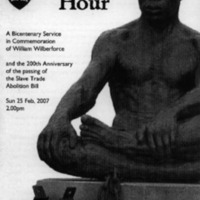
The Better Hour: A Bicentenary Service in Commemoration of William Wilberforce
A bicentenary service in commemoration of William Wilberforce and the passing of the 200th anniversary of the Abolition Act took place in February 2007 at York Minster. The service featured Pocklington School Choir, Transglobal Drummers and the Riding Lights Theatre Company (performing extracts of…
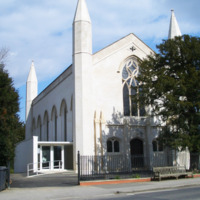
Celebration of the Bicentenary of the Abolition of the Atlantic Slave Trade
After 1825, on leaving Parliament, William Wilberforce retired to Hendon Park in Mill Hill, North London, and during his retirement built a chapel on his estate, now St. Paul's Church. St. Paul's organised a programme of events in 2007 to mark the bicentenary, including concerts by The London…